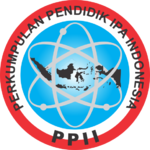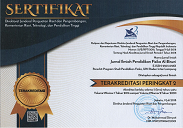Students’ Learning Motivation through the Quality of Scientific Argumentation Skills and Students’ Cognitive Learning Outcomes on Newton's Laws: A Relationship Analysis
Abstract
Keywords
Full Text:
PDFReferences
Abraham, J., & Barker, K. (2015). Exploring gender difference in motivation, engagement, and enrolment behavior of senior secondary physics students in new south wales. Research in Science Education, 45(1), 59–73. https://doi.org/10.1007/s11165-014-9413-2
Acar, O., & Patton, B. R. (2012). Argumentation and formal reasoning skills in an argumentation-based guided inquiry course. Procedia - Social and Behavioral Sciences, 46, 4756–4760. https://doi.org/10.1016/j.sbspro.2012.06.331
Aryani, W. D., Suhendi, E., Suyana, I., Samsudin, A., & Kaniawati, I. (2019). Effectiveness of implementation interactive conceptual instruction (ICI) with computer simulation to overcome students' misconceptions about newton's Law of gravitation. Journal of Physics: Conference Series, 1280(1), 1–7. https://doi.org/10.1088/1742-6596/1280/5/052011
Aufschnaiter, C. V., Erduran, S., Osborne, J., & Simon, S. (2008). Arguing to learn and learning to argue: Case studies of how students’ argumentation relates to their scientific knowledge. Journal of Research in Science Teaching, 45(1), 101–131. https://doi.org/10.1002/tea.20213
Berland, L. K., & McNeill, K. L. (2010). A learning progression for scientific argumentation: Understanding student work and designing supportive instructional contexts: Learning progression for scientific argumentation. Science Education, 94(5), 765–793. https://doi.org/10.1002/sce.20402
Çinar, D., & Bayraktar, Ş. (2014). Evaluation of the effects of argumentation-based science teaching on 5th-grade students’ conceptual understanding of the subjects related to “matter and change.” International Journal of Education in Mathematics, Science and Technology, 2(1), 49–77.
Crump, C. A. (1995). Motivating students: A teacher’s challenge. West Texas A&M University, 1–21.
Darmaji, D., Astalini, A., Kurniawan, D. A., & Perdana, R. (2019). A study relationship attitude toward physics, motivation, and character discipline students senior high school, in Indonesia. International Journal of Learning and Teaching, 11(3), 99–109. https://doi.org/10.18844/ijlt.v11i3.4207
Davidson, P., Roslan, S., Omar, Z., Chong Abdullah, M., Looi, S. Y., Neik, T. T. X., & Yong, B. (2019). Validation of competing structural models of inter-relationships in the teaching-learning ecosystem for two Malaysian STEM courses. Asia Pacific Education Review, 20(1), 15–36. https://doi.org/10.1007/s12564-018-9567-0
Deng, Y., & Wang, H. (2017). Research on evaluation of Chinese students’ competence in written scientific argumentation in the context of chemistry. Chemistry Education Research and Practice, 18(1), 127–150. https://doi.org/10.1039/C6RP00076B
Docktor, J. L., & Mestre, J. P. (2014). Synthesis of discipline-based education research in physics. Physical Review Special Topics - Physics Education Research, 10(2), 020119. https://doi.org/10.1103/PhysRevSTPER.10.020119
Ebadi, S., Ashtarian, S., & Zamani, G. (2020). Exploring arguments presented in predatory journals using toulmin’s model of argumentation. Journal of Academic Ethics, 18(4), 435–449. https://doi.org/10.1007/s10805-019-09346-0
Eliana, D., & Admoko, S. (2020). Tren pembelajaran argumentasi berbasis toulmin’s argument pattern (TAP) dalam meningkatkan kemampuan argumentasi dan pemahaman konsep fisika peserta didik. IPF: Inovasi Pendidikan Fisika, 09(02), 246–255.
Erduran, S., Guilfoyle, L., Park, W., Chan, J., & Fancourt, N. (2019). Argumentation and interdisciplinarity: Reflections from the Oxford argumentation in religion and science project. Disciplinary and Interdisciplinary Science Education Research, 1(1), 1–10. https://doi.org/10.1186/s43031-019-0006-9
Eskin, H., & Ogan-Bekiroglu, F. (2013). Argumentation as a strategy for conceptual learning of dynamics. Research in Science Education, 43(5), 1939–1956. https://doi.org/10.1007/s11165-012-9339-5
Fadlli, M. R., Sutopo, & Wartono. (2019). Analisis kesulitan siswa dalam menyelesaikan soal hukum newton. Jurnal Pendidikan: Teori, Penelitian, dan Pengembangan, 4(8), 993–997. http://dx.doi.org/10.17977/jptpp.v4i8.12652
Faize, F. A., Husain, W., & Nisar, F. (2017). A Critical review of scientific argumentation in science education. EURASIA Journal of Mathematics, Science and Technology Education, 14(1), 475–483. https://doi.org/10.12973/ejmste/80353
Fischer, H. E., & Horstendahl, M. (1997). Motivation and learning physics. Research in Science Education, 27(3), 411–424. https://doi.org/10.1007/BF02461762
Gunawan, Y. I. P. (2018). Pengaruh motivasi belajar terhadap keaktifan siswa dalam mewujudkan prestasi belajar siswa. Khazanah Akademia, 02(01), 74–84.
Hakan, K., & Münire, E. (2014). Academic motivation: Gender, domain and grade differences. Procedia - Social and Behavioral Sciences, 143, 708–715. https://doi.org/10.1016/j.sbspro.2014.07.469
Hakyolu, H., & Ogan-Bekiroglu, F. (2016). Interplay between content knowledge and scientific argumentation. EURASIA Journal of Mathematics, Science and Technology Education, 12(12), 3005–3033. https://doi.org/10.12973/eurasia.2016.02319a
Ju, H., Choi, I., & Yoon, B. Y. (2017). Do medical students generate sound arguments during small group discussions in problem-based learning?: An analysis of preclinical medical students’ argumentation according to a framework of hypothetico-deductive reasoning. Korean Journal of Medical Education, 29(2), 101–109. https://doi.org/10.3946/kjme.2017.57
Kind, P. M., Kind, V., Hofstein, A., & Wilson, J. (2011). Peer argumentation in the school science laboratory—Exploring effects of task features. International Journal of Science Education, 33(18), 2527–2558. https://doi.org/10.1080/09500693.2010.550952
Kusnadi, K., Lazuardi, Z., & Surakusumah, W. (2019). The Conceptual change of human respiratory system through POE-Based learning. Journal of Physics: Conference Series, 1280(3), 1–6. https://doi.org/10.1088/1742-6596/1280/3/032009
Kutluca, A. Y., Çetin, P. S., & Doğan, N. (2013). Effect of content knowledge on scientific argumentation quality: Cloning context. Necatibey Faculty of Education Electronic Journal of Science and Mathematics Education, 8(1), 1–30. https://doi.org/10.12973/nefmed.2014.8.1.a1
Lee, C.-Q., & She, H.-C. (2010). Facilitating students’ conceptual change and scientific reasoning involving the unit of Combustion. Research in Science Education, 40(4), 479–504. https://doi.org/10.1007/s11165-009-9130-4
Li, S., & Zheng, J. (2017). The effect of academic motivation on students’ English learning achievement in the eSchoolbag-based learning environment. Smart Learning Environments, 4(1), 1–14. https://doi.org/10.1186/s40561-017-0042-x
Murti, P. R., Aminah, N. S., & Harjana. (2019). The identification of high school students' knowledge of newton's Law of science literacy using a test based on nature of science (NOS). Journal of Physics: Conference Series, 1153(1), 012122. https://doi.org/10.1088/1742-6596/1153/1/012122
Ogan-Bekiroglu, F., & Eskin, H. (2012). Examination of the relationship between engagement in scientific argumentation and conceptual knowledge. International Journal of Science and Mathematics Education, 10(6), 1415–1443. https://doi.org/10.1007/s10763-012-9346-z
Oh, S., & Jonassen, D. H. (2007). Scaffolding online argumentation during problem solving: Scaffolding online argumentation. Journal of Computer Assisted Learning, 23(2), 95–110. https://doi.org/10.1111/j.1365-2729.2006.00206.x
Oktalia, Y., Sakti, I., & Hamdani, D. (2017). Pengaruh minat dan motivasi pada penerapan model diskoveri berbantuan media animasi terhadap hasil belajar fisika di SMA negeri 4 Kota Bengkulu. Jurnal Pembelajaran Fisika, 1(1), 87–95.
Osborne, J. (2005). The role of argument in science education. In K. Boersma, M. Goedhart, O. de Jong, & H. Eijkelhof (Eds.), Research and the Quality of Science Education (pp. 367–380). Springer Netherlands. https://doi.org/10.1007/1-4020-3673-6_29
Özdem Yilmaz, Y., Cakiroglu, J., Ertepinar, H., & Erduran, S. (2017). The pedagogy of argumentation in science education: Science teachers’ instructional practices. International Journal of Science Education, 39(11), 1443–1464. https://doi.org/10.1080/09500693.2017.1336807
Paramita, A., Dasna, I. W., & Yahmin, Y. (2019). Kajian pustaka: Integrasi stem untuk keterampilan argumentasi dalam pembelajaran sains. J-PEK (Jurnal Pembelajaran Kimia), 4(2), 92–99. https://doi.org/10.17977/um026v4i22019p092
Rahman, A. (2018). Kemampuan argumentasi ilmiah dan penguasaan konsep materi hukum Newton siswa kelas X SMA Kota Banjarmasin. Skripsi. Universitas Negeri Malang.
Rapanta, C., Garcia-Mila, M., & Gilabert, S. (2013). What is meant by argumentative competence? An integrative review of methods of analysis and assessment in education. Review of Educational Research, 83(4), 483–520. https://doi.org/10.3102/0034654313487606
Rusmono, R., Sulardi, S., & Suyitno, S. (2018). Influence of learning model and learning motivation to learning outcome of micro hydropower plant. IOP Conference Series: Materials Science and Engineering, 434(1), 012028. https://doi.org/10.1088/1757-899X/434/1/012028
Rutter, K. L., Smith, B. P., & Hall, H. C. (2005). The effects of gender and grade level on the motivational needs of family and consumer sciences students. Journal of Family and Consumer Sciences Education, 23(2), 19–26.
Sampson, V., & Clark, D. B. (2011). A comparison of the collaborative scientific argumentation practices of two high and two low performing groups. Research in Science Education, 41(1), 63–97. https://doi.org/10.1007/s11165-009-9146-9
Sampson, V., Enderle, P., Grooms, J., & Witte, S. (2013). Writing to learn by learning to write during the school science laboratory: Helping middle and high school students develop argumentative writing skills as they learn core ideas: Writing to learn by learning to write in science. Science Education, 97(5), 643–670. https://doi.org/10.1002/sce.21069
Saputra, H. D., Ismet, F., & Andrizal, A. (2018). Pengaruh motivasi terhadap hasil belajar siswa SMK. INVOTEK: Jurnal Inovasi Vokasional dan Teknologi, 18(1), 25–30. https://doi.org/10.24036/invotek.v18i1.168
Sari, N., Murniati, & Ilyas, S. (2020). The implementation of problem-based learning modules to decrease misconception on Newton’s law topic. Journal of Physics: Conference Series, 1460(1), 012137. https://doi.org/10.1088/1742-6596/1460/1/012137
Sarira, P. M., Priyayi, D. F., & Astuti, S. P. (2019). Hubungan argumentasi ilmiah dan hasil belajar kognitif pada penerapan model problem based learning (PBL). Edu Sains Jurnal Pendidikan Sains & Matematika, 7(2), 1–10. https://doi.org/10.23971/eds.v7i2.1258
Sayre, E. C., Franklin, S. V., Dymek, S., Clark, J., & Sun, Y. (2012). Learning, retention, and forgetting of newton's third law throughout university physics. Physical Review Special Topics - Physics Education Research, 8(1), 010116. https://doi.org/10.1103/PhysRevSTPER.8.010116
Sekerci, A. R., & Canpolat, N. (2017). Argumentation skills of Turkish freshman university students in chemistry laboratory. Journal of Educational Sciences & Psychology, VII (LXIX)(1), 26—39.
Serway, R. A., & Jewett, J. W. (2004). Physics for scientists and engineers (6th ed). Thomson-Brooks/Cole.
Singh, K., Granville, M., & Dika, S. (2002). Mathematics and science achievement: Effects of motivation, interest, and academic engagement. The Journal of Educational Research, 95(6), 323–332. https://doi.org/10.1080/00220670209596607
Sukma, Komariyah, L., & Syam, M. (2016). Pengaruh model pembelajaran inkuiri terbimbing (Guided inquiry) dan motivasi terhadap hasil belajar fisika siswa pengaruh model pembelajaran inkuiri terbimbing (guided inquiry) dan motivasi terhadap hasil belajar fisika siswa. Saintifika, 18(1), 49–63.
Walker, J. P., & Sampson, V. (2013). Learning to argue and arguing to learn: Argument-driven inquiry as a way to help undergraduate chemistry students learn how to construct arguments and engage in argumentation during a laboratory course: Learning to argue and arguing to learn. Journal of Research in Science Teaching, 50(5), 561–596. https://doi.org/10.1002/tea.21082
Wang, J., & Buck, G. (2015). The relationship between chinese students’ subject matter knowledge and argumentation pedagogy. International Journal of Science Education, 37(2), 340–366. https://doi.org/10.1080/09500693.2014.987713
Yaman, F. (2018). Effects of the science writing heuristic approach on the quality of prospective science teachers’ argumentative writing and their understanding of scientific argumentation. International Journal of Science and Mathematics Education, 16(3), 421–442. https://doi.org/10.1007/s10763-016-9788-9
Yun, S. M., & Kim, H.-B. (2015). Changes in students’ participation and small group norms in scientific argumentation. Research in Science Education, 45(3), 465–484. https://doi.org/10.1007/s11165-014-9432-z
DOI: http://dx.doi.org/10.24042/jipfalbiruni.v10i1.7642
Refbacks
- There are currently no refbacks.

Jurnal ilmiah pendidikan fisika Al-Biruni is licensed under a Creative Commons Attribution-ShareAlike 4.0 International License.
![]()







